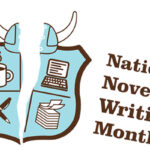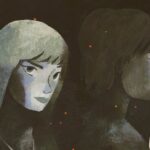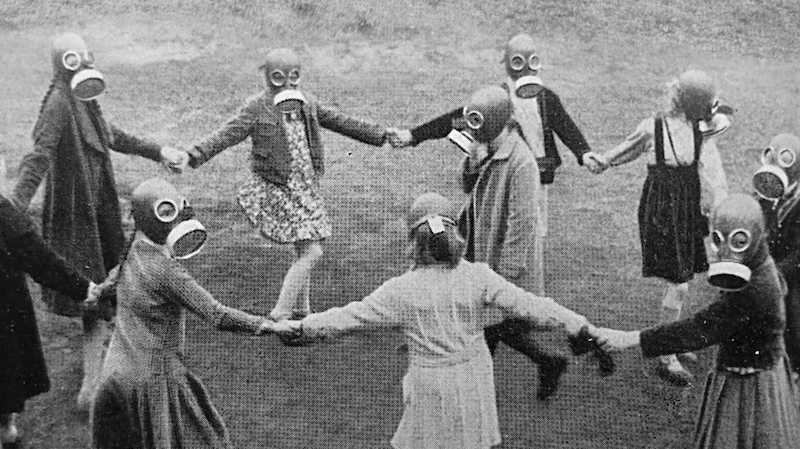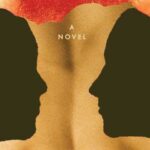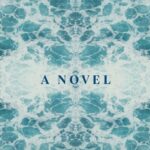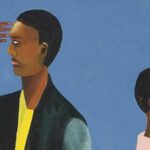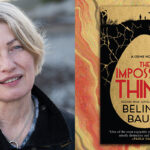Who Was Mary Shelley, Daughter?
Samantha Silva on the Liminal Space Between Daughterhood and Motherhood
I’m driving across the rolling Palouse of eastern Washington, colored by wheat and summer sky, just me in the car, and the voice of actor Dan Stevens reading Mary Shelley’s Frankenstein. “Oh, that’s the saddest story that’s ever been written,” a friend’s voice rings in my head, and I know she’s right. I’ve just dropped my 17-year old daughter, Olive, the youngest of my three children, at film camp outside of Seattle, another practice run for when she leaves home soon for the wilds of Los Angeles, where I won’t be able to protect her. I’m not ready for her to go, not ready to be done mothering her. I have so much to make up for, so much I still want her to forgive. I’ve lost my own mother three months before, suddenly, though after a long illness. The strangeness of a world without her still haunts me, but the soft expanse, the big sky, absorbs my grief. I feel lighter than I have in months, can feel myself beginning to dream again. On that ancient alluvial prairie, hills rising and falling in and out of view, I am dreaming of Mary Wollstonecraft.
I didn’t know, when I conceived Love and Fury, that I’d write a mother-daughter story. It was the 200th anniversary of Frankenstein; Mary Shelley was everywhere, known and revered in her own right. “What about Wollstonecraft?” someone whispered in my ear, who intuited that liminal space I was in then, between my daughterhood and motherhood. And Wollstonecraft did, capture my imagination entirely. Still, I didn’t know how to contain her remarkable life in the shape of a novel: her rough, abusive, peripatetic childhood, a spotty education, no means or future prospects; how that doesn’t stop her, in fact, animates her lifelong rebellion against tyranny in all its guises, be it men, marriage, or kings. Demanding independence for herself, and gender equality for all, she becomes the great 18th-century radical writer and philosopher, author of A Vindication of the Rights of Woman, who lives her 38 years like the comet that blazes across London skies in that final month of her too short existence. It’s not yet called “feminism,” but by any measure, Wollstonecraft invents the life.
But it’s her death that draws me in.
That same comet heralds the birth of a daughter on August 30th, 1797 who will grow up to be Mary Shelley, but her arrival in the world also marks the start of the last 11 days of her mother’s life. The baby’s born, after a long labor, weak and low, and isn’t expected to live. There are rumors in the house they’re to build her a tiny coffin. When she finally nurses and begins to gain strength, Wollstonecraft develops puerperal fever because a doctor, called in to deliver a stubborn placenta, sticks his dirty hand in her womb. For the first half of their fleeting time together, the mother thinks she will lose her newborn daughter. For the last, she knows that her daughter will lose her. Those 11 days haunt me too. How you could possibly say goodbye. What you’d want your daughter to know.
I get a flash sometimes to reach for my phone to tell my mom some small piece of news I know she’d delight in, and in the next flash, I remember. I still keep the voicemails from before her big forgetting, our own long, slow good-bye. It would be too heartbreaking to listen to them, but I need to know there’s an archive somewhere of her melodic “hello” that holds all my childhood in it, and so much more.
Daughters make stories about their mothers, some true, some rising to myth. Mine was that she and I had never bonded, were never close. I was the third baby girl in three years. It wasn’t modern to nurse your children. I’m sure she was blind-weary, the way young mothers are. But if it rained she packed a picnic and took her little girls upstairs to the attic, taught us to make ornaments out of cut felt, let us dress up in her clothes, wear our swimsuits in the rain, make mud pies. Still, I didn’t see myself as being like her. In my own coming of age, I saw her as sacrificing herself, too sweet, too accommodating, too perfect, not ambitious, not deep enough, not fiery, not fighting, the way I wanted to be.
Wollstonecraft hated marriage, thought it oppressed women and should be avoided whenever possible, but she held motherhood in lofty regard. She argued passionately for the bond between mother and child that breastfeeding engendered, nature coinciding with duty. She’d experienced it with her first daughter, Fanny, and despite her own struggles with depression, thought pregnancy and childbirth the most natural thing in the world. Wollstonecraft adored being a mother, loved how hungrily her little girl sucked. For her, a mother who didn’t nurse or educate her children (girls the same as boys), didn’t deserve the name of wife or the rights of a citizen.
For the first half of their fleeting time together, the mother thinks she will lose her newborn daughter. For the last, she knows that her daughter will lose her.It breaks my heart to imagine her newborn daughter, too listless to suck, then finally latching on, taking sustenance, gaining life force, just as Wollstonecraft begins to lose hers. Somewhere in those 11 days, a doctor orders the child to a wet nurse, and puppies brought in to relieve Mary’s engorged, painful breasts. I can’t bear the thought of it, because I don’t know how she could. I want mother and child to have had one transcendent day together, at least, a few moments of milk and marrow, love and joy.
Nursing my own children was the thing I did best. I was hormone-drunk with happiness when pregnant, nearly giddy the first year of their lives. Cross-eyed with exhaustion, I still couldn’t stand to hear them cry themselves to sleep, so brought them in to share our bed, nurse when they wanted. I loved the physical closeness of breastfeeding, the staring into their little faces, them looking back at me, not yet knowing where they ended and I began. It felt like the most right thing I’d ever done. I’m good at this part, I thought, the bonding. They will always feel how profoundly I loved them.
I have two memories from my mom’s last lucid days. In the first, I’m sitting with her when the kind doctor with a Russian accent tells her she has Alzheimer’s. We’ve both been thinking it, all these tests, all these weeks. But here it is, no escape from this terrible truth. All I can do is squeeze her bird-bone hand in mine. She nods and tears up, a soft smile, full of dignity. “Well, I’ve had a wonderful life,” she says. “I don’t regret a thing.”
In the second memory, I’ve flown home from London, where I’m living with my filmmaker husband and three kids, to tell her I’m leaving my marriage, that I’ve fallen in love with another man, also married, with grown children. He’s been our friend for 20 years, along with his wife, but now he’s something else to me. And all our lives will never be the same. I’m terrified to tell her. Not afraid she’ll judge me—she doesn’t judge anyone—but that she’ll worry, be scared for me, for all of us, and that it will tear her heart to pieces. Sitting there in her back garden among her roses, barberries, potted geraniums, her beloved maple on fire in fall, I decide I can’t tell her. I don’t feel brave enough, don’t want to hurt her. It will wait another time. That’s when she starts asking after my kids, one by one, and then my husband, whom she adores. She wants to hear every detail. Then she trains her warm green eyes on me, no smile. “And what about you?” she says, “Tell me about you.” She’s always trusted her intuition about her five kids. I know I can’t hide from that, can’t lie. I still remember the tremolo in my voice when I say it, straight out. Mom looks at me calmly, no sing-song in her voice at all, only gravity. “Everyone deserves to be happy,” she says.
Frankenstein is the saddest book ever written because it’s about a creator who abandons his creation. A parent who leaves a child.On the day I leave our house in North London, not far from where Wollstonecraft lived the last months of her life, then ten-year-old Olive turns away from me with her hands on her head. “I can’t believe this is happening,” she says. It feels like a cleaving, a banishment, but one I’ve chosen, negotiated as a way to get my girls home in three months. My son’s left for university in Cairo. It’s the Arab Spring. Even when we have to arrange to spirit him out of the country when he’s in danger of arrest, he refuses to speak to me, and won’t for almost a year. My daughters don’t want to see me either, though I fly back to London to try, wandering the Christmas fair at the Brutalist Barbican by myself, like a woman whose center might not hold. I feel less guilt about my son; he’s had 18 years of us whole as a family, my older daughter, 15. But Olive is such a tender age, and hasn’t had what they did. I didn’t know the day I left that she was soon to have her first period. Soon to hear her father crying upstairs at night, soon to stay home from school to take care of her sister who woke up one day and couldn’t move her legs, the adrenaline coursing through her body shutting everything down.
People we know said I’d abandoned my children. It takes all my strength not to believe it myself.
The day my mother died, Olive and I had come by just to say hello, give her a hug. She’d been in locked down memory care for two years, didn’t know our names anymore, but her face lit up when we visited. We had no idea we’d walk into a full-blown deathbed scene. My brother was there, holding her hand as mom took those awful rattling last breaths. I kept turning to Olive to say, “You don’t have to be here, to watch this, you can take the car,” but with tears creeking down her face, she just shook her head. Neither of us had seen anyone die, and it was my mother, whom I knew Olive loved. Tender Olive, who feels everything so deeply, not just her own pain, but everyone’s.
I called my sisters and told them to come right away, but before they could get there, mom was gone. The nursing staff confirmed it, no heartbeat, no pulse. But when my sisters walked through the door, mom came back from the dead, I swear. Her mind was a wisp, but how fiercely her body clung to us. I will never forget that astonishing breath she drew, like a drowning woman dredged from the watery deep, sucking, gasping for air to fill her lungs, and live just a little while longer.
It’s the breath I imagine Wollstonecraft takes when she’s pulled from the Thames by a wherryman after jumping off Putney Bridge, her second suicide attempt after a tragic love affair with American Gilbert Imlay, Fanny’s father, whom she met in Paris where she’d gone to witness the Revolution and its aftermath. When she discovers Imlay no longer loves her, but an actress with a strolling troupe, Wollstonecraft soaks her skirts with rain walking back and forth on the bridge to make herself heavy, so she’ll drown faster. I imagine the wherryman pressing on her belly, slapping her back to expel the water from her lungs. Then that shocking breath, not like the one that ends your life, but the one that begins it. The same one our children take when they emerge from the dark safety of our womb into the cold, bright world, where they will have to make their way, alone.
Frankenstein is the saddest book ever written because it’s about a creator who abandons his creation. A parent who leaves a child. Shelley’s monster is left to wander the frozen North alone, across its icy nothingness, forever. When all it ever wanted was to feel loved.
Daughters make stories about their mothers, some true, some rising to myth.Shelley made a story about her mother too, haunted by that absence in her life. Wollstonecraft was a legend in the circles she grew up in. Shelley idealized her, devoured everything she’d written, was a disciple in all ways, even making love with Percy Shelley at her mother’s grave in Old St. Pancras Churchyard, where they read her work aloud, like an incantation to draw her close.
But Shelley knew, too, the unruly part of her mother’s life. Her father, the philosopher William Godwin, wrote a tell-all memoir in the weeks after his wife’s death. He wanted the world to understand Wollstonecraft’s literary and philosophical feats, but instead the world chose to dwell on her depressions, her trembling fits, scandalous love affairs, an out-of-wedlock child, two suicide attempts. In most circles, it sank her reputation for a century. But Shelley surely took inspiration from the boldness of that life, full of flesh, blood, heat, want, fury, hope, despair. A life that she lived too.
I hold fast to the myth of my mom. In so many ways she was the mother I wanted to be, but wasn’t. Yet I see her best qualities in my children. She was kind and good, she was generous. She believed in equality with every atom of her being, and hated injustice in all its awful varieties. But there are pieces of her life that don’t fit neatly. That she once took a lover, a young man my father brought home, who lived with us for a year. That she let us wear black armbands to school to protest Vietnam, then insisted on going to Washington to the biggest anti-war march in history. That she left my father after 25 years of marriage, and embarked on a long career as an advocate for women’s health. That she fell in love with a married man who wouldn’t leave his wife, and carried on a passionate affair for years. We hardly spoke of it, but her life was messy too.
I feel her story, like mine, shift and change, coming in and out of view, like the Palouse where I wander, just me. This gentle, undulating earth was made by cataclysmic floods that swept across it at the end of the last glacial age. An ice dam would rupture, spilling the lake that destroyed everything in its path, until the ice re-formed, and began it all again. But each cycle left fine-grained layers of windblown loess that settled into deep, rich soil. So much destruction turned, with time, to unspeakable beauty.
I don’t know whether Olive will forgive me, what story she will make of me. It’s hers to tell. She knows, more than my other children, where I end and she begins. But there’s some freedom in it too, an unburdening, the lightness that I feel. For this brief moment in my own geologic time, before I turn the car around to pick her up from camp, I am neither daughter, nor mother, all mess, no myth. I am fertile loess floating on the wind, dreaming of the same world that Wollstonecraft, Shelley, and so many mothers and daughters have, across time—a world where everyone is equal, deserves to be happy, and feel loved.





